Question Marks and Exclamation Points with Quotation Marks
A question mark or an exclamation point goes inside quotes when it is meant to punctuate the quoted text, but outside if it applies to the larger sentence. Therefore, we place a question mark or exclamation point before a closing quotation mark only if the quoted text is a question or an exclamation.
- Lulu asked, “Why?”
The quoted text is a question, so the question mark goes inside quotes.
- She cried, “It can fly!”
The quoted text is an exclamation, so the exclamation point goes inside quotes.
If the larger sentence is the question or exclamation instead (and the quoted text is part of it), place the question mark or exclamation point after rather than before the closing quotation mark.
- Did she really use the word “dragon”?
The entire sentence is the question, not the text inside quotes.
- She used the word “dragon”!
The entire sentence is an exclamation.
Question inside question, exclamation inside exclamation
Don’t use two question marks or two exclamation points together, even if one is within quotes. To show a quoted question within a sentence that is also a question, use just a single question mark inside quotes.
- Correct: Did she just ask, “Is this free?”
Incorrect: Did she just ask, “Is this free?”?
Similarly, to show a quoted exclamation within an exclamation, use a single exclamation point within quotes.
- Correct: She shouted, “It’s free!”
Incorrect: She shouted, “It’s free!”!
Question mark with exclamation point
When an exclamation appears inside quotes at the end of a sentence that is a question, use both the exclamation point and the question mark if you consider both essential.
- Then why did you yell, “Fire!”?
Use both punctuation marks if it is important to show that the exclamation is within a question.
Similarly, use both a question mark and an exclamation point to show a quoted question within an exclamation.
- I can’t believe she just asked, “Are you OK?”!
If you can omit the exclamation point without affecting meaning, do so.
- Did she just shout, “Dragon”?
- She just asked, “Where are we?”
Quotes may also contain a proper noun, like the name of a poem, that ends in a question mark or an exclamation point. In such rare cases, use both punctuation marks as needed.
- Have you read her poem “Heart, We Will Forget Him!”?
- I love “Are You There?”!
Period with question mark or exclamation point
Don’t use a period before or after a question mark or exclamation point.
- Correct: Did she just say, “It’s a dragon”?
Incorrect: Did she just say, “It’s a dragon.”? - Correct: She just asked, “Is it a dragon?”
Incorrect: She just asked, “Is it a dragon?”. - Correct: She cried, “It’s a dragon!”
Incorrect: She cried, “It’s a dragon!”.
Periods, question marks, and exclamation points are all terminal punctuation marks, which means they end sentences. When a question mark or exclamation point appears at the end of a sentence, it does the job of ending the sentence, without the need for a period.
The only exception is a period at the end of an abbreviation, after which you would use a question mark or exclamation point as usual.
- Correct: She asked, “Is it 6 a.m.?”
Incorrect: She asked, “Is it 6 a.m?” - Correct: She cried, “It’s 6 a.m.!”
Incorrect: She cried, “It’s 6 a.m!”
Mid-sentence question or exclamation
If a question or an exclamation appears within quotes in the middle of a larger sentence, use a question mark or exclamation point before the closing quotation mark.
- The question, “Do you lie?” is illogical.
- Only when she exclaimed “Alas!” did we believe she was a time traveler.
Commas with quoted questions and exclamations
Don’t use a comma after quoted speech that ends in a question mark or exclamation point. (Direct speech is usually separated from the speaker using a comma, but this comma is omitted after a question or an exclamation.)
- Correct: “Who’s that?” she said.
Incorrect: “Who’s that?,” she said. - Correct: “I’m free!” she said.
Incorrect: “I’m free!,” she said.
Unless absolutely necessary, don’t use a comma after a question mark or an exclamation point. Even when a quotation appears mid-sentence, modern style is to use the comma before but omit the one after the question or exclamation.
- Unnecessary: The question, “Do you lie?,” is illogical.
Better: The question, “Do you lie?” is illogical.
Other punctuation with quotation marks
Unlike question marks and exclamation points, commas and periods always go inside quotation marks in American usage, regardless of whether they apply to the quoted text or the surrounding sentence.
- “I haven’t read that poem,” she said.
- If this is “progress,” I can do without it.
- She said, “I haven’t read that poem.”
- This isn’t “progress.”
In British usage, commas and periods go inside quotes only if they are meant to punctuate the quoted text, but outside if they apply to the larger sentence (just like exclamation points and question marks).
- ‘I haven’t read that poem,’ she said.
- She said, ‘I haven’t read that poem.’
- If this is ‘progress’, I can do without it.
- This isn’t ‘progress’.
For more discussion and examples, see these articles on commas with quotation marks and periods with quotation marks.

